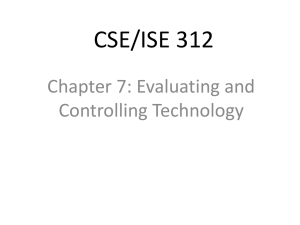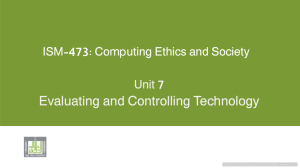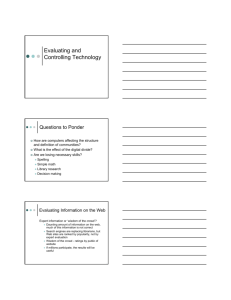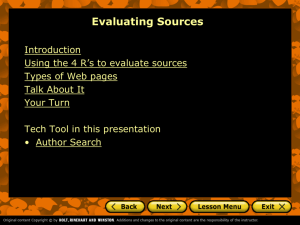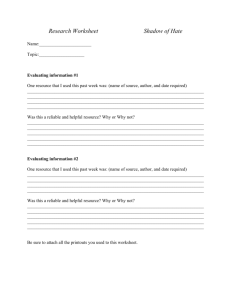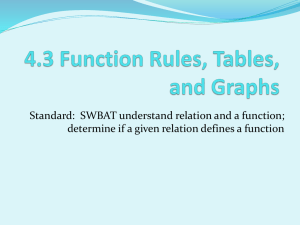312 - 07 - Evaluating Technology
advertisement
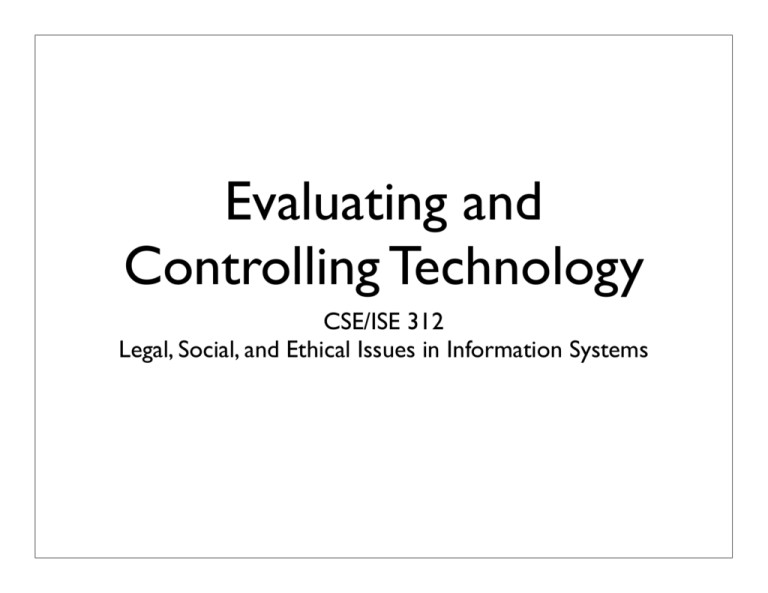
Evaluating and Controlling Technology CSE/ISE 312 Legal, Social, and Ethical Issues in Information Systems Evaluating Info on the Web • Much of what we find on the Net is wrong • Search engines rank by popularity, not accuracy • “Democratic journalism” • Wikipedia vs. Citizendium • Site operator responsibilities • Image manipulation Writing, Thinking, Deciding • Computers make many tasks easier • does this lead to a loss of basic skills? • New tools can change social patterns • People let computers think for them Computer Models • Models allow us to simulate and investigate possible effects of different scenarios • they are simplifications • life-cycle models, finite-element models • Conclusions differ based on the model used • e.g., climate, car crashes, health care Computers and Community • • Computers change the traditional idea of “community” • • Critics: computers reduce face-to-face gathering Is the Internet destroying communities? • Wal-Mart analogy Online communities • Second Life, gaming communities The Digital Divide • Some groups of people have access to computers while others do not • Focus has shifted from rich vs. poor to developed vs. poorer countries • Divide is generated by cost and ease of use • “haves” and “have-laters”, rather than “haves” and “have-nots” The Global Divide • 1B people have access to the Web • That leaves 5-6B without access • One Laptop Per Child initiative • $100, ruggedized laptop running Linux • Need to provide access in culturallyappropriate ways Healthcare • Electronic health records • Google Health, Continuity of Care Record • Telemedicine (live vs. store-and-forward) • Health-related Web sites • WebMD, MedicineNet Evaluating Computers • On a scale of “miracle” to “catastrophe”, where do computers fall? • Should we condemn the technology as a whole for the risks it carries? • Should the textbook have been named “Pandora’s Box” instead of “A Gift of Fire”? Neo-Luddites • 1811-12: English workers, led by Ned Ludd, attacked factories and mills that used new technology • “Luddite”: one who opposes technical progress • Neo-Luddites: people who criticize computers and the Internet Neo-Luddite Criticisms • Computers: • • Cause massive unemployment, de-skilling of jobs • • • Cause social inequity “Manufacture needs” rather than satisfying real needs Cause social disintegration Do little or nothing to solve real human problems The Neo-Luddite Perspective • Negative view of businesses and capitalism • technology to increase profit, not help workers • Technology creates a need for itself • Buyers are manipulated by ads, work pressure Neo-Luddite Views (II) • Tech offers no or limited improvement in life • improvements are “industrial virtues” • many generations got along without tech; we can too • Morality: a thing is “right” when it enhances nature, and wrong otherwise Technology’s Accomplishments • Some people say things have gotten worse over time due to technology • counter-arguments: food prices, wages, crop yields, life expectancy • Who benefits most from tech? • Gov’t? Big business? Ordinary people? The poor? The disabled? Making Decisions About Technology Some Questions • Who should decide whether to use part or all of a technology? • Some people say we should investigate all possible consequences first • How well can we predict the consequences of a new invention? Prediction Difficulties • Computers were originally designed to calculate ballistic trajectories • PCs were originally designed to write documents and perform computations • Web was originally designed by physicists to share data • Each has evolved beyond its original intent Next Time • Chapter 8 • Errors, Failures, and Risks
